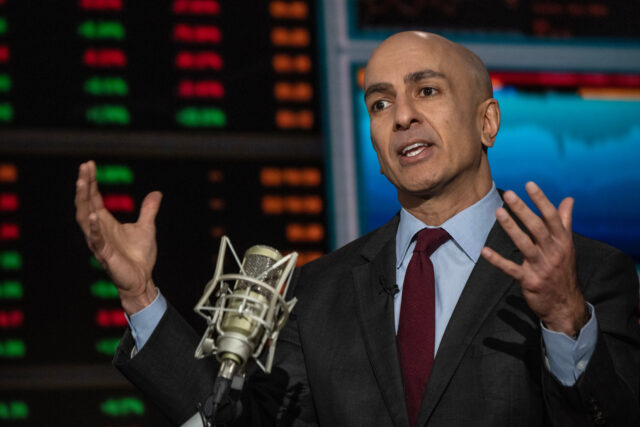Surging immigration is keeping inflation and interest rates high, Fed honcho Neel Kashkari said in an interview with the Telegraph.
Kashkari, who runs the Federal Reserve Bank of Minneapolis, said he’s not ready to consider cutting rates until he sees “several months of real progress on inflation.” The flood of immigrants, he argued, is hindering that progress.
U.S. borrowing costs are likely to stay put for “an extended period of time,” Kashkari warned.
He’s particularly freaked out by the booming demand for housing, which just won’t cool off despite sky-high rates.
Kashkari’s immigration bombshell runs directly contrary to the claims by the Biden administration and its allies that surging immigration is keeping down inflation by depressing wages.
Kashkari said that “dramatic increase in immigration” is boosting housing demand. More people working from home and years of underbuilding aren’t helping either. It’s a perfect storm that’s keeping the housing market red-hot.
“[If the] dramatic increase in immigration were to be sustained, I think it would have a meaningful imprint on the economy,’ Kashkari told the Telegraph.
“Housing is traditionally the most interest-rate sensitive sector of the economy. And it has shown remarkable resilience and even some evidence that new leases are ticking back up,” Kashkari said. “That’s also particularly concerning because when we do the math, it takes a year or more for new leases to translate into the actual measured inflation number. And if new leases are now ticking back up, that’s particularly concerning.”
Kashkari argued that the U.S. had under-built homes in the decade that followed the financial crisis and the bursting of the mortgage bubble, creating a shortage of homes. At the same time, there has been increased demand for housing after the pandemic.
“And then we have a big surge in immigration in the last few years. They obviously need a place to live. All of these factors could be propping up demand for housing,” Kashkari added.
Since July 2023, the Fed has held interest rates at 5.25 percent to 5.5 percent. At the start of the year, Fed officials and financial markets expected the Fed to cut several times this year.
But inflation surged to a 3.4 percent annualized rate in the first three months of the year, spooking markets and forcing Fed officials to reconsider their plans. Fed Chairman Jerome Powell recently said it “will take longer than previously expected” to hit the two percent inflation target.
Kashkari said rate cuts aren’t likely anytime soon. And he would not rule out the possibility that the Fed’s next move on interest rates could be an increase, although he sees that as an unlikely turn of events. Most likely, in his view, the Fed stays on hold for longer than many expect.
“I think the balance of risks suggests it will likely be down but we shouldn’t rule anything out at this point. I think a more likely scenario is that we sit where we are for an extended period of time,” he said.
He also noted that services inflation had been “much stickier” in the past few months, making it even tougher to justify rate cuts.
“In the second half of last year, we saw very rapid disinflationary progress, and that was comforting for all of us because the economy was strong and inflation was falling quickly. I expected and hoped that that was going to continue in the first quarter of this year [but] inflation has more or less moved sideways,” Kashkari said.
Like other Fed officials, Kashkari said he needs solid proof that inflation is heading back to 2 percent before he’s comfortable with rate cuts.
“I want to see evidence that inflation is headed well back down towards the 2 percent target. I’m not saying that we have to get all the way back down to 2 percent before we start cutting, but I need to be convinced that that’s where we’re headed before I would be comfortable normalizing interest rates,” he said.

COMMENTS
Please let us know if you're having issues with commenting.